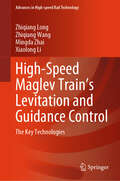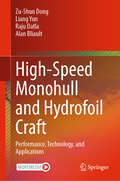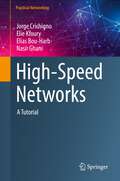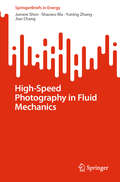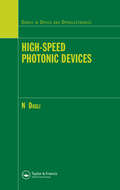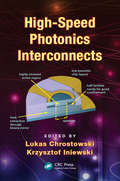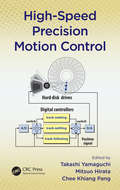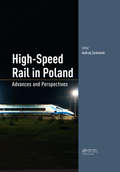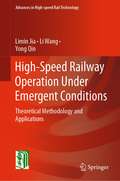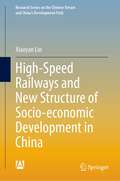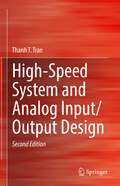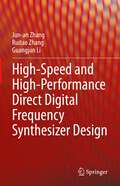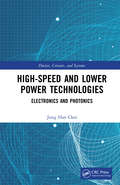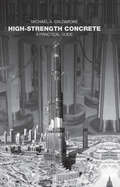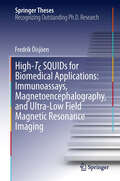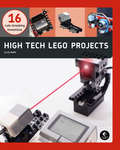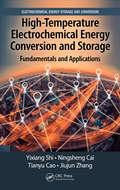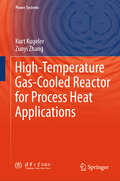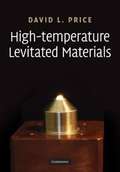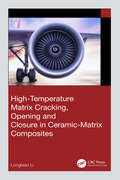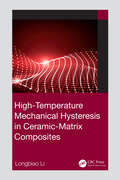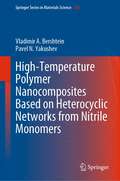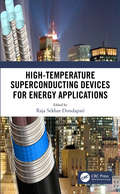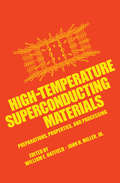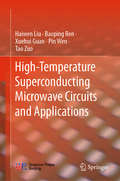- Table View
- List View
High-Speed Maglev Train’s Levitation and Guidance Control: The Key Technologies (Advances in High-speed Rail Technology)
by Xiaolong Li Zhiqiang Long Zhiqiang Wang Mingda ZhaiThis book highlights the system modeling, control, diagnosis and fault-tolerant design of the suspension, and guidance system of the high-speed maglev train based on electromagnetic suspension technology. The electromagnetic suspension technology has been widely used in real-life engineering, including maglev trains, magnetic bearings, magnetic levitation vibration isolators, magnetic suspension and balance systems for wind tunnels, etc. Based on the academic researches, engineering applications, and technical innovations of high-speed maglev trains carried out by the maglev team of the National University of Defense Technology, this book summarizes the technical achievements in the field of levitation and guidance control technology of high-speed maglev train. It analyzes the research status and challenges of the suspension control technology of the electromagnetic suspension maglev train. The suspension, guidance system modeling, and controller design of the high-speed maglev train are described in detail. The performance index and performance evaluation method of the levitation and guidance system under various working conditions are analyzed respectively. A suspension scheme of permanent magnet electromagnetic hybrid suspension high-speed maglev train is proposed, and the results of the vehicle test are given in order to further improve the suspension energy consumption and heating of electromagnetic suspension high-speed maglev train. The suspension and guidance fault diagnosis and tolerant control methods of the high-speed maglev train are studied to improve the system's safety and reliability. The research and application results of suspension control technology of electromagnetic suspension maglev train are fully displayed for readers. This book is intended for researchers, scientists, engineers, and graduate students involved in the rail transit industry, train control and diagnosis, and maglev technology.
High-Speed Monohull and Hydrofoil Craft: Performance, Technology, and Applications
by Alan Bliault Liang Yun Zu-Shun Dong Raju DatlaHigh Speed Monohull and Hydrofoil Craft: Performance, Technology, and Applications provides comprehensive coverage of the basic hydrodynamics of high-speed monohulls and hydrofoil craft useful to students and engineers alike. The first half of the book introduces different hull shapes for semi-planing and planing craft with examples from their development through the last century. Succeeding chapters then describe the hydrodynamic theory behind their performance in calm water and a seaway. They also document the extensive series of model test programs naval architects use to create prediction models for resistance and powering. Electronic versions of a number of these are included for readers’ use. A final chapter on monohulls looks at hull geometric form that has been developed to provide the best possible combination of resistance in waves and motion response through a combination of a deep and sharp forefoot and a hard chine cross-section towards the stern for patrol vessels and offshore logistics craft. The book’s second half introduces the various geometries and planform configurations of hydrofoils under a fast craft hull. It reviews the development of these craft for inland waterways, such as major river systems, and the rougher environment of seaways, such as the Mediterranean and Atlantic oceans. It is followed by hydrofoil theory in an ideal fluid close to a free surface. Then the theory for a real fluid includes the vorticity and effect of planform, dihedral, and surface interaction. Hydrofoil craft design and analysis are covered next. Finally, there is a chapter on special configurations, such as craft having foils just at the bow and hydrofoil craft based on catamaran hulls.
High-Speed Networks: A Tutorial (Practical Networking)
by Elias Bou-Harb Jorge Crichigno Elie Kfoury Nasir GhaniThis book provides practical knowledge and skills on high-speed networks, emphasizing on Science Demilitarized Zones (Science DMZs). The Science DMZ is a high-speed network designed to facilitate the transfer of big science data which is presented in this book. These networks are increasingly important, as large data sets are now often transferred across sites. This book starts by describing the limitations of general-purpose networks which are designed for transferring basic data but face numerous challenges when transferring terabyte- and petabyte-scale data. This book follows a bottom-up approach by presenting an overview of Science DMZs and how they overcome the limitations of general-purpose networks. It also covers topics that have considerable impact on the performance of large data transfers at all layers: link layer (layer-2) and network layer (layer-3) topics such as maximum transmission unit (MTU), switch architectures, and router’s buffer size; transport layer (layer-4) topics including TCP features, congestion control algorithms for high-throughput high-latency networks, flow control, and pacing; applications (layer-5) used for large data transfers and for maintenance and operation of Science DMZs; and security considerations. Most chapters incorporate virtual laboratory experiments, which are conducted using network appliances running real protocol stacks. Students in computer science, information technology and similar programs, who are interested in learning fundamental concepts related to high-speed networks and corresponding implementations will find this book useful as a textbook. This book assumes minimal familiarity with networking, typically covered in an introductory networking course. It is appropriate for an upper-level undergraduate course and for a first-year graduate course. Industry professionals working in this field will also want to purchase this book.
High-Speed Photography in Fluid Mechanics (SpringerBriefs in Energy)
by Jian Chang Yuning Zhang Junwei Shen Shaowu MaThis brief overviews the application and significance of high-speed photography in experimental fluid mechanics, specifically focusing on the detailed observation and analysis of bubble dynamics, drop dynamics, and wake dynamics. It explores the development and various application scenarios of high-speed imaging technology, using it to investigate microscopic phenomena within these areas. The book covers key topics such as bubble collapse and deformation, particle acceleration mechanisms, and cavitating flow patterns in bubble dynamics; droplet impact, coalescence, and fragmentation in drop dynamics; and the wake phenomena of bluff bodies during translation, rotation, and interactions with flat surfaces in wake dynamics. Through experimental observations and mechanism research, the book provides insights into the underlying processes and behaviors in fluid systems, making it a valuable resource for researchers and students in fluid mechanics and energy related fields.
High-Speed Photonic Devices
by Nadir DagliWith the ongoing, worldwide installation of 40 Gbit/s fiber optic transmission systems, there is an urgency to learn more about the photonic devices supporting this technology. Focusing on the components used to generate, modulate, and receive optical signals, High-Speed Photonic Devices presents the state-of- the-art enabling technologies behind h
High-Speed Photonics Interconnects (Devices, Circuits, and Systems #13)
by Krzysztof Iniewski Lukas ChrostowskiDramatic increases in processing power have rapidly scaled on-chip aggregate bandwidths into the Tb/s range. This necessitates a corresponding increase in the amount of data communicated between chips, so as not to limit overall system performance. To meet the increasing demand for interchip communication bandwidth, researchers are investigating the use of high-speed optical interconnect architectures. Unlike their electrical counterparts, optical interconnects offer high bandwidth and negligible frequency-dependent loss, making possible per-channel data rates of more than 10 Gb/s. High-Speed Photonics Interconnects explores some of the groundbreaking technologies and applications that are based on photonics interconnects. From the Evolution of High-Speed I/O Circuits to the Latest in Photonics Interconnects Packaging and Lasers Featuring contributions by experts from academia and industry, the book brings together in one volume cutting-edge research on various aspects of high-speed photonics interconnects. Contributors delve into a wide range of technologies, from the evolution of high-speed input/output (I/O) circuits to recent trends in photonics interconnects packaging. The book discusses the challenges associated with scaling I/O data rates and current design techniques. It also describes the major high-speed components, channel properties, and performance metrics. The book exposes readers to a myriad of applications enabled by photonics interconnects technology. Learn about Optical Interconnect Technologies Suitable for High-Density Integration with CMOS Chips This richly illustrated work details how optical interchip communication links have the potential to fully leverage increased data rates provided through complementary metal-oxide semiconductor (CMOS) technology scaling at suitable power-efficiency levels. Keeping the mathematics to a minimum, it gives engineers, researchers, graduate students, and entrepreneurs a comprehensive overview of the dynamic landscape of high-speed photonics interconnects.
High-Speed Precision Motion Control
by Takashi Yamaguchi, Mitsuo Hirata and Chee Khiang PangEdited by Takashi Yamaguchi, Mitsuo Hirate, and Chee Khiang Pang, with contributions from pioneers known for their ground-breaking work, High-Speed Precision Motion Control discusses high-precision and fast servo controls in hard disk drives (HDDs). The chapter authors describe the control technologies they’ve developed, most of which have already been successfully applied to mass production of HDDs. As the proposed methodologies have been verified on commercial HDDs at the very least, these advanced control technologies can also be readily applied to precision motion control of other mechatronic systems, e.g., scanners, micro-positioners, photocopiers, atomic force microscopes (AFMs), etc. Each self-contained chapter progresses from concept to technique and presents application examples in automotive, aerospace, aeronautical, and manufacturing engineering. The control technologies are categorized into high-speed servo control, precision control, and environment-friendly control, making it easy to find an appropriate control technology according to their domain of application. The book also makes MATLAB®/SIMULINK® codes for benchmark problems available for download. The control technologies described range from fundamental classical control theories to advanced topics such as multi-rate control. The content contains a healthy balance between materials from the contributor’s research works and that in the wider literature. The resulting resource empowers engineers and managers with the knowledge and know-how to make important decisions and policies.
High-Speed Rail in Poland: Advances and Perspectives
by Andrzej ZurkowskiThe Railway Research Institute (Instytut Kolejnictwa) in Warsaw was established in 1951 and was, until 2000, part of the Polish State Railways (PKP). At present, it serves as an independent entity, it is subordinated to the minister responsible for transport. Since its inception, the Institute has been the centre of competence for technology, technique and organization of operation and services in rail transport, particularly in respect to innovation. One of its fundamental tasks also includes activities connected with safety which are carried out in close cooperation with the National Safety Authority, i.e. the Office of Rail Transport. At the same time the Institute participated in the process of upgrading and modernization of the rail network in Poland. Experience in high speed rail, gained as a result of international cooperation and basing on the effort to increase speed on railway lines in Poland (so far 200 km/h), is included in the monograph “Koleje Dużych Prędkości w Polsce” (High Speed Rail in Poland) published in 2015 for the benefit of the Polish reader. This monograph aims at reaching an international audience of experts so as to present Polish determinants of HSR implementation. In order to elaborate this monograph, apart from specialists from the Railway Research Institute, experts from other research and academic centres were invited. Not only presenting a wide range of problems connected with future construction of High Speed Lines in Polish conditions, but also a number of operational ones. The authors have created a reference work of universal character, solving problems in order to build and operate high speed rail systems in countries on a similar level of development as Poland. Features: providing requirements for design and upgrade of engineering works on High Speed Rail development information on restructuring and building railway lines for countries starting to develop a High Speed Rail system dealing with organizational, engineering, socioeconomic and economic demands for transport services and the formation of human resources for constructing and operting a High Speed Rails system. Presenting these problems on the international arena will facilitate future cooperation and application of world experience to create HSR in Poland and integrate the Polish HSR network into the international one.
High-Speed Railway Operation Under Emergent Conditions: Theoretical Methodology and Applications (Advances in High-speed Rail Technology)
by Li Wang Limin Jia Yong QinThis book addresses the current development status of high-speed railways globally and analyzes their operational schemes and practices under emergent conditions. It covers methods and problem-solving philosophy with regard to complexity analysis, capacity evaluation, passenger-flow forecasts, operating strategies, passenger-flow allocation, resource allocation and supporting technologies in the context of serious accidents and adverse environmental influences on train operation and service organization of high-speed railways. The abnormal scenarios, emergent conditions, adverse events and corresponding theoretical and applicational solutions dealing with the train operation both in line and network scale are all from real-world cases related to and designed for Chinese high-speed railway network which is the largest in scale, the highest in complexity and the most difficult in tackling with the complex and diverse climate and geographical environment , and thus makes the book both theoretically rigorous and practically applicable. It not only helps readers consider the train and network interactions from the perspective of complexity science, but also provides them with a philosophical framework and approaches available to construct their own roadmap and problem-solving paradigms in their daily research or management. This book is suitable for researchers, postgraduates and managerial and engineering practitioners in railway-related fields, especially in high-speed railway operation and emergency management.
High-Speed Railways and New Structure of Socio-economic Development in China (Research Series on the Chinese Dream and China’s Development Path)
by Xiaoyan LinThis book systematically expounds the significance of the high-speed railway in China's regional economic and social development. It also contains a large number of case discussions, so that readers can fully understand the development of China's high-speed railway and its role in promoting China's economy. The purpose of this book is to determine whether high-speed railway has important political and strategic significance for China's development, the inherent relationship and mechanism of the high-speed railway together with economic and social development, and how to achieve the high-speed rail and economic and social coordination, as well as sustainable development.
High-Speed System and Analog Input/Output Design
by Thanh T. TranThe new edition of this textbook is based on Dr. Thanh T. Tran’s 10+ years’ experience teaching high-speed digital and analog design courses at Rice University and 30+ years’ experience working in high-speed system design, including signal and power integrity in digital signal processing (DSP), computer, and embedded system. The book provides hands-on, practical instruction on high-speed digital and analog design for students and working engineers. The author first presents good high-speed digital and analog design practices that minimize both component and system noise and ensure system design success. He then presents guidelines to be used throughout the design process to reduce noise and radiation and to avoid common pitfalls while improving quality and reliability. The book is filled with tips on design and system simulation that minimize late stage redesign costs and product shipment delays. Hands-on design examples focusing on audio, video, analog filters, DDR memory, and power supplies are featured throughout. In addition, the author provides a practical approach to design multi-gigahertz high-speed serial busses (USB-C, PCIe, HDMI, DP) and simulate printed circuit board insertion and return loss using s-parameter models.
High-Speed and High-Performance Direct Digital Frequency Synthesizer Design
by Guangjun Li Jun-an Zhang Ruitao ZhangThe book focuses on design technology of high-speed and high-performance direct digital frequency synthesizer (DDS) chip. The technologies involves phase to amplitude converter design, D/A converter design, phase accumulator design, multi-chip synchronization circuit design, etc. In each chapter, the concept of the technology is explained first, and then the features of different implementation schemes are introduced through the real design cases. More over, a design case of a 2.5GHz monolithic DDS in 0.18 μm CMOS which was designed by the authors are introduced in detail, which can help the reader understanding about the of DDS design deeply. The book is suitable for the readers who are interested to learn practical design technology in DDS. The book can benefit researchers, engineers, and graduate students in fields of mix-signal IC design, communication engineering, electronics engineering, and radar engineering, etc.
High-Speed and Lower Power Technologies: Electronics and Photonics (Devices, Circuits, and Systems)
by Krzysztof Iniewski Jung Han ChoiThis book explores up-to-date research trends and achievements on low-power and high-speed technologies in both electronics and optics. It offers unique insight into low-power and high-speed approaches ranging from devices, ICs, sub-systems and networks that can be exploited for future mobile devices, 5G networks, Internet of Things (IoT), and data centers. It collects heterogeneous topics in place to catch and predict future research directions of devices, circuits, subsystems, and networks for low-power and higher-speed technologies. Even it handles about artificial intelligence (AI) showing examples how AI technology can be combined with concurrent electronics. Written by top international experts in both industry and academia, the book discusses new devices, such as Si-on-chip laser, interconnections using graphenes, machine learning combined with CMOS technology, progresses of SiGe devices for higher-speed electronices for optic, co-design low-power and high-speed circuits for optical interconnect, low-power network-on-chip (NoC) router, X-ray quantum counting, and a design of low-power power amplifiers. <li>Covers modern high-speed and low-power electronics and photonics. <li>Discusses novel nano-devices, electronics & photonic sub-systems for high-speed and low-power systems, and many other emerging technologies like Si photonic technology, Si-on-chip laser, low-power driver for optic device, and network-on-chip router. <li>Includes practical applications and recent results with respect to emerging low-power systems. <li>Addresses the future perspective of silicon photonics as a low-power interconnections and communication applications.
High-Strength Concrete: A Practical Guide
by Michael A. CaldaroneThis practical book from a highly experienced author presents clearly the means and methods for designing, producing and using high-strength concrete.High-strength concrete offers many benefits. Higher compressive strengths allow for a reduction in the cross-sectional dimensions of columns and walls in buildings. Its greater stiffness allows for increasing building heights while controlling sway and occupant comfort. Civil structures such as bridges have benefited from greater span lengths, shallower beam sections, wider girder spacing, and extended service life.Illustrated with real life examples, through documented case histories, High-Strength Concrete will be a valuable resource for contractors, producers, inspection agencies, as well as engineers and researchers.
High-Tc SQUIDs for Biomedical Applications: Immunoassays, Magnetoencephalography, and Ultra-Low Field Magnetic Resonance Imaging
by Fredrik ÖisjöenThis thesis describes the challenging task of developing high critical temperature superconducting quantum interference devices (high-Tc SQUIDs) and using them as sensors for biomedical applications, including magnetic immunoassays, magnetoencephalography and magnetic resonance imaging (MRI). The first part of this work discusses the development of fast magnetic immunoassays, which can be used to improve the sensitivity, or to create new, unique point-of-care diagnostics systems. The second part shows that high-Tc SQUIDs might make magnetoencephalography more available, thus opening the field of high-Tc SQUID-based magnetoencephalography for recording brain functions. This technique can be combined with ultra-low field MRI which is discussed in the last part. This combination may provide a new unique tool for studies of brain functions. This work does not simply improve on existing technology but opens possibilities for novel advanced medical devices and techniques.
High-Tech LEGO Projects: 16 Rule-Breaking Inventions
by Grady KochA collection of 16 fascinating scientific and technical projects to build with parts from the LEGO MINDSTORMS EV3 robotics set and other components. A great addition to any STEM curriculum or home library.High Tech LEGO® hijacks the MINDSTORMS® EV3 revolution, showing you how to build creative technical inventions with practical applications. You'll learn to build a dynamic array of working devices for outdoor research, home security, spycraft, and more.Among the book's 16 fascinating projects you'll find a motion-activated animal cam, a Morse code transmitter, a laser security fence, a motion-sensing radar detector, an automated insect trapper, and a heat-seeking infrared cannon. Welcome to a whole new world of building!Every project brings together science, mechanics, electronics, optics, and software to create complex instruments for studying and measuring the world around you, all while maintaining the playfulness of LEGO. Each easy-to-follow model combines illustrated instructions with step-by-step guidance on the engineering methods at play.As you build, you'll learn: • "Illegal" modding techniques (that may include drilling, cutting and soldering -- Shh!) • Different ways to work with diode laser modules • Tricks for modifying EV3 sensors and motors • The joy of hacking LEGO light bricks to make a flickering fireplace • How to use MINDSTORMS to build your own contraptions!Experiment on your own, and expand on your finished creations. Make a few adjustments so the Critter Cam triggers an alarm to scare away pests, or modify the Doppler radar to detect flammable gases. The possibilities are endless!REQUIREMENTS: LEGO® MINDSTORMS® EV3 Home Edition Windows Vista or higher macOS 10.14 or earlier
High-Temperature Electrochemical Energy Conversion and Storage: Fundamentals and Applications (Electrochemical Energy Storage and Conversion)
by Jiujun Zhang Yixiang Shi Ningsheng Cai Tianyu CaoAs global demands for energy and lower carbon emissions rise, developing systems of energy conversion and storage becomes necessary. This book explores how Electrochemical Energy Storage and Conversion (EESC) devices are promising advanced power systems that can directly convert chemical energy in fuel into power, and thereby aid in proposing a solution to the global energy crisis. The book focuses on high-temperature electrochemical devices that have a wide variety of existing and potential applications, including the creation of fuel cells for power generation, production of high-purity hydrogen by electrolysis, high-purity oxygen by membrane separation, and various high-temperature batteries. High-Temperature Electrochemical Energy Conversion and Storage: Fundamentals and Applications provides a comprehensive view of the new technologies in high-temperature electrochemistry. Written in a clear and detailed manner, it is suitable for developers, researchers, or students of any level.
High-Temperature Gas-Cooled Reactor for Process Heat Applications (Power Systems)
by Kurt Kugeler Zuoyi ZhangThis book highlights the process of heat applications driven by modular high-temperature gas-cooled reactors (HTGRs) which have inherent safety characteristics and high outlet temperature. The book systematically covers related principles, guidelines and discussion about circuits, components and the coupling with HTGR, recommendations of safety measures, and economic and environmental requirements, with examples and experience from long-term practice. The combination of the HTGR technology and process heat applications not only is important for promoting the use of HTGR but also provides an option of significant potential for the replacement of conventional fossil fuels. With over a thousand illustrations, the book is of outstanding reference value for researchers and professionals to develop a thorough understanding.
High-Temperature Levitated Materials
by David L. PriceOne of the major experimental difficulties in studying materials at extreme temperatures is unwanted contamination of the sample through contact with the container. This can be avoided by suspending the sample through levitation. This technique also makes metastable states of matter accessible, opening up new avenues of scientific enquiry, as well as possible new materials for technological applications. This book describes several methods of levitation, the most important being aerodynamic, electromagnetic and electrostatic. It summarizes the state-of-the-art of the measurement of structural, dynamic and physical properties with levitation techniques, the considerable progress made in this field in the past two decades, and prospects for the future. It also explores the concepts behind the experiments and associated theoretical ideas. Aimed at researchers in physics, physical chemistry and materials science, the book is also of interest to professionals working in high-temperature materials processing and the aerospace industry.
High-Temperature Matrix Cracking, Opening and Closure in Ceramic-Matrix Composites
by Longbiao LiCeramic matrix composites (CMCs) can withstand higher temperatures, reduce cooling airflow, improve turbine efficiency, and greatly reduce structural mass compared to the high temperature alloys. This book focuses on the matrix first/multiple cracking, crack opening and closure behavior in CMCs at high temperatures. While conducting in situ experimental observations to analyze the damage mechanisms and failure modes, the author develops micromechanical damage models and constitutive models to predict the first matrix cracking stress, multiple matrix cracking density, matrix crack opening displacement, and cracking closure stress at high temperatures. The effects of composite’s constituent properties, stress level, and ambient temperature on matrix cracking, opening, and closure are also discussed. This book will help material scientists and engineering designers to understand and master the matrix cracking and closure behavior of fiber-reinforced CMCs.
High-Temperature Mechanical Hysteresis in Ceramic-Matrix Composites
by Longbiao LiThis book focuses on mechanical hysteresis behavior in different fiber-reinforced ceramic-matrix composites (CMCs), including 1D minicomposites, 1D unidirectional, 2D cross-ply, 2D plain-woven, 2.5D woven, and 3D needle-punched composites. Ceramic-matrix composites (CMCs) are considered to be the lightweight high-temperature materials for hot-section components in aeroengines with the most potential. To improve the reliability and safety of CMC components during operation, it is necessary to conduct damage and failure mechanism analysis, and to develop models to predict this damage as well as fracture over lifetime - mechanical hysteresis is a key damage behavior in fiber-reinforced CMCs. The appearance of hysteresis is due to a composite’s internal damage mechanisms and modes, such as, matrix cracking, interface debonding, and fiber failure. Micromechanical damage models and constitutive models are developed to predict mechanical hysteresis in different CMCs. Effects of a composite’s constituent properties, stress level, and the damage states of the mechanical hysteresis behavior of CMCs are also discussed. This book also covers damage mechanisms, damage models and micromechanical constitutive models for the mechanical hysteresis of CMCs. This book will be a great resource for students, scholars, material scientists and engineering designers who would like to understand and master the mechanical hysteresis behavior of fiber-reinforced CMCs.
High-Temperature Polymer Nanocomposites Based on Heterocyclic Networks from Nitrile Monomers (Springer Series in Materials Science #334)
by Vladimir A. Bershtein Pavel N. YakushevThis book presents an overview of polymer nanocomposites for use in various high-temperature applications. Specifically, it focuses on the structure and physical properties of nanocomposites based on heterocyclic matrices derived from nitrile monomers such as cyanate esters or phthalonitriles. Due to increasing interest in new heat-resistant, lightweight materials for use in extreme conditions, such as in aeronautics, microelectronics, and various industrial machinery, the high thermal stability of heterocyclic polymer networks, in particular, has attracted much attention from materials researchers and engineers. Featuring a comprehensive review of the most recent advances in research on the structure and physical properties of these promising high-temperature polymer nanocomposites, this book will be of particular interest to materials scientists and engineers working throughout the fields of aeronautical and microelectronic engineering. In general, this book is intended for use by researchers of composite materials and specialists engaged in material selection for work in extreme conditions; for students specializing in materials science; for polymer physicists, and for university libraries.
High-Temperature Superconducting Devices for Energy Applications
by Hamed FazlollahtabarThis book presents novel concepts in the development of high-temperature superconducting (HTS) devices and discusses the technologies involved in producing efficient and economically feasible energy technologies around the world. High-Temperature Superconducting Devices for Energy Application covers the application of high-temperature superconductors in clean energy production and allied cooling technologies. In addition, it presents the compatibility of other materials involved in the construction of various devices at cryogenic temperatures. It also summarizes superconducting fault current limiters (SFCL) and related grid stabilization. The book addresses the need to lower the losses incurred with efficient power transmission. The aim of this book is to serve the needs of industry professionals, researchers, and doctoral students studying energy technologies. Features Discusses the history of the development of high-temperature superconductors Covers cryogenic cooling technologies adapted for various superconducting devices Presents a detailed design of superconducting generators Highlights the importance of superconducting magnetic energy storage (SMES) devices in the power grid Focuses on theoretical computations
High-Temperature Superconducting Materials: Preparations, Properties, and Processing
by John H. Miller William E. HatfieldThis book is a collection of proceedings of a symposium organized by the North Carolina Section of the American Chemical Society on the preparations, properties, and processing of high-temperature superconducting materials. The proceedings include papers of new results presented at the symposium.
High-Temperature Superconducting Microwave Circuits and Applications
by Haiwen Liu Baoping Ren Xuehui Guan Pin Wen Tao ZuoHigh-temperature superconducting (HTS) materials are becoming more and more attractive in the context of designing RF/microwave filters because of their lower losses and excellent performance. This book focuses on the superconducting microwave filter and its application in modern communication. It first presents the basic principles, HTS materials and processing and then introduces several types of multi-band HTS bandpass filter (BPF), discussing their properties and analyzing equivalent circuit models and their performances. This book is a valuable resource for students and researchers who are interested in wireless communication and RF/microwave design.
